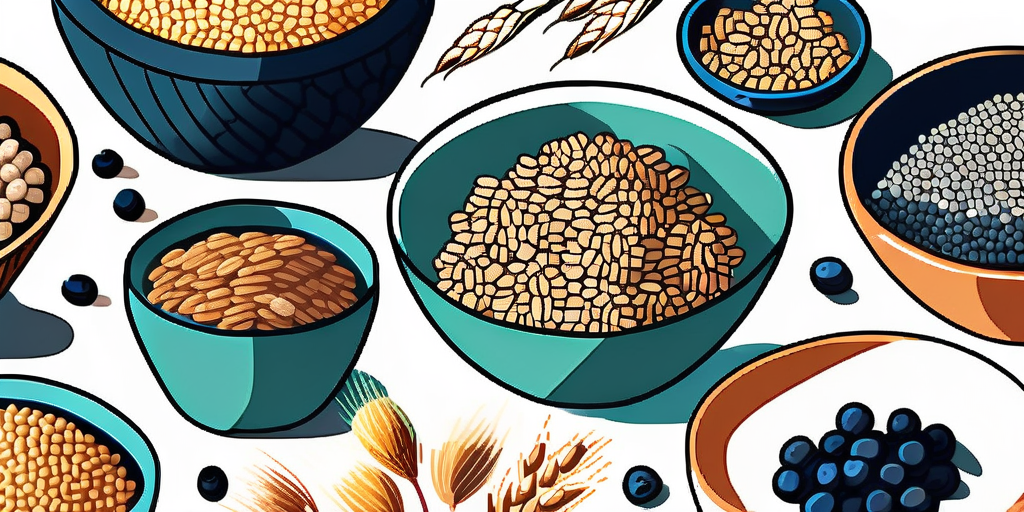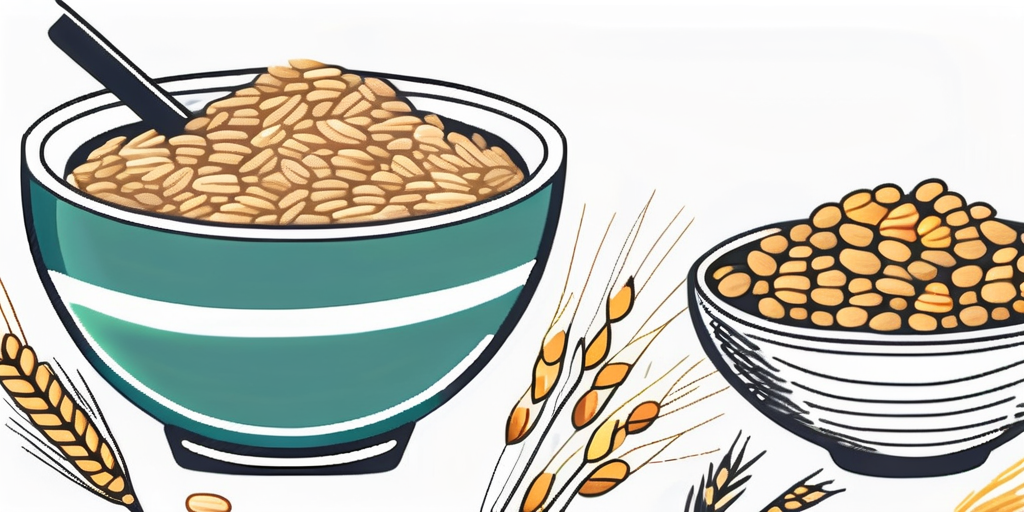In today's fast-paced world, it can be challenging to find the time to prioritize our health and well-being. However, one simple and delicious way to take care of ourselves is by starting our day with a bowl of whole grain cereal. Not only does whole grain cereal provide a convenient and nutritious breakfast option, but it also offers a myriad of health benefits that can improve our overall well-being. Let's explore the benefits of whole grain cereal, from understanding what whole grains are to debunking common misconceptions.
Understanding Whole Grain Cereals
Before we delve into the benefits, let's take a closer look at what whole grain cereals actually are. Whole grains refer to grains that have not been stripped of their bran and germ, unlike refined grains. As a result, whole grains retain all the essential nutrients, such as fiber, vitamins, and minerals, making them a wholesome food choice.

What are Whole Grains?
Whole grains encompass a range of cereal grains that are consumed in their entirety, including wheat, oats, barley, corn, and rice. The outer layer, known as the bran, contains fiber, antioxidants, and B vitamins. The germ, located at the core, is rich in healthy fats, vitamin E, and minerals. By retaining these components, whole grains provide a more complete and nutritious package compared to refined grains.
Whole grains have been a staple in human diets for thousands of years. Ancient civilizations relied on these grains for sustenance and energy. In fact, evidence of whole grain consumption can be traced back to ancient Egypt, where grains like barley and emmer wheat were commonly consumed. These civilizations recognized the nutritional value of whole grains and incorporated them into their daily meals.
Today, whole grains continue to be an important part of a healthy diet. They are a key source of dietary fiber, which aids in digestion and helps maintain a healthy weight. Whole grains also contain a variety of vitamins and minerals, including B vitamins, iron, magnesium, and selenium. These nutrients play crucial roles in supporting overall health and well-being.
The Different Types of Whole Grain Cereals
When it comes to whole grain cereals, the options are plentiful. You can choose from classics like oatmeal, whole wheat flakes, or even experiment with ancient grains like quinoa or amaranth. Each cereal variety offers a unique flavor and texture, ensuring that there is something to suit everyone's taste preferences.
Oatmeal, for example, is a popular choice for breakfast due to its creamy texture and nutty flavor. It is made from whole oats, which are high in fiber and provide a good source of energy to start the day. Oatmeal can be enjoyed plain or topped with fruits, nuts, or honey for added sweetness and nutrition.
Whole wheat flakes, on the other hand, are a crunchy and satisfying option. Made from whole wheat grains that have been flattened and toasted, these flakes are rich in fiber and provide a hearty breakfast option. They can be enjoyed with milk or yogurt, and can also be used as a topping for smoothie bowls or desserts.
If you're looking to explore more unique whole grain options, ancient grains like quinoa and amaranth are worth considering. Quinoa, often referred to as a "superfood," is a complete protein source and contains all nine essential amino acids. It has a light and fluffy texture, making it a versatile ingredient in salads, stir-fries, and even desserts. Amaranth, on the other hand, is a gluten-free grain that has a slightly nutty flavor. It can be cooked and enjoyed as a porridge or used as a substitute for rice in various dishes.
With such a wide variety of whole grain cereals available, incorporating them into your diet can be both delicious and nutritious. Whether you prefer the comforting taste of oatmeal or the crunch of whole wheat flakes, whole grain cereals offer a range of options to suit every palate.
The Nutritional Profile of Whole Grain Cereals
Whole grain cereals are powerhouses of essential nutrients, making them an excellent choice to kick-start your day. Let's explore some key vitamins, minerals, and the role of fiber in whole grain cereals:
Key Vitamins and Minerals in Whole Grains
Whole grain cereals provide a wide array of vitamins and minerals, including B vitamins (thiamine, riboflavin, niacin, and folate), vitamin E, magnesium, iron, and selenium. These nutrients play crucial roles in energy production, brain function, and overall well-being.
Thiamine, also known as vitamin B1, is essential for converting carbohydrates into energy. It helps maintain a healthy nervous system and supports proper heart function. Riboflavin, or vitamin B2, is involved in energy metabolism, growth, and the maintenance of healthy skin and eyes. Niacin, or vitamin B3, aids in the breakdown of carbohydrates, fats, and proteins, ensuring a steady supply of energy. Folate, also known as vitamin B9, is crucial for DNA synthesis and cell division, making it especially important during periods of rapid growth, such as pregnancy.
Vitamin E is a powerful antioxidant that protects cells from damage caused by free radicals. It also plays a role in immune function and helps maintain healthy skin and eyes. Magnesium is involved in over 300 biochemical reactions in the body, including energy production, muscle and nerve function, and maintaining a steady heartbeat. Iron is essential for the production of red blood cells, which transport oxygen throughout the body. Selenium acts as an antioxidant and is necessary for proper thyroid function and DNA synthesis.
The Role of Fiber in Whole Grain Cereals
Fiber is a critical component found abundantly in whole grain cereals. It promotes digestive health, regulates blood sugar levels, and helps maintain a healthy weight. Additionally, it contributes to a feeling of fullness, reducing the likelihood of overeating throughout the day.
There are two types of fiber: soluble and insoluble. Soluble fiber dissolves in water and forms a gel-like substance in the digestive tract. It helps lower cholesterol levels, regulates blood sugar levels, and promotes a healthy gut by feeding beneficial gut bacteria. Insoluble fiber, on the other hand, adds bulk to the stool, preventing constipation and promoting regular bowel movements.
Whole grain cereals are an excellent source of both types of fiber. The soluble fiber found in these cereals helps slow down the absorption of carbohydrates, preventing blood sugar spikes and crashes. It also helps lower LDL cholesterol levels, reducing the risk of heart disease. Insoluble fiber, on the other hand, adds bulk to the stool, promoting regular bowel movements and preventing digestive issues such as constipation.
Furthermore, the fiber in whole grain cereals provides a feeling of fullness, which can help control appetite and prevent overeating. This can be particularly beneficial for individuals looking to maintain a healthy weight or manage conditions such as diabetes.
In conclusion, whole grain cereals offer a wide range of essential vitamins, minerals, and fiber. Incorporating them into your diet can provide numerous health benefits, including improved energy levels, brain function, and digestive health. So, start your day right with a bowl of whole grain cereal and enjoy the nutritional goodness it brings!
Health Benefits of Whole Grain Cereal
The consumption of whole grain cereals has been linked to various health benefits. Let's explore a couple of key areas:
Whole Grain Cereals and Heart Health
Studies have shown that incorporating whole grain cereals into your diet can contribute to a healthier heart. The high fiber content in whole grains helps lower cholesterol levels and reduces the risk of heart disease. Fiber acts as a broom, sweeping away excess cholesterol and preventing it from clogging up your arteries. By keeping your arteries clear, whole grain cereals help maintain healthy blood flow, reducing the risk of heart attacks and strokes.
But that's not all! Whole grain cereals are also rich in antioxidants and phytochemicals. These powerful compounds provide protection against oxidative stress and inflammation, both of which are key contributors to heart disease. By neutralizing harmful free radicals and reducing inflammation, whole grain cereals help keep your heart healthy and functioning optimally.
Whole Grains and Digestive Health
The fiber-rich nature of whole grain cereals promotes healthy digestion and prevents constipation. Fiber adds bulk to your stool, making it easier to pass through your digestive system. This not only helps prevent constipation but also promotes regular bowel movements, ensuring that waste is efficiently eliminated from your body.
But the benefits don't stop there! The consumption of whole grains has been associated with a reduced risk of gastrointestinal conditions such as diverticulosis and colon cancer. The fiber in whole grain cereals helps maintain the health of your intestines by providing nourishment to the beneficial bacteria in your gut. These bacteria play a crucial role in maintaining a healthy digestive system and protecting against harmful pathogens.
Furthermore, whole grain cereals contain a variety of vitamins and minerals that support digestive health. These include B vitamins, magnesium, and zinc, which are essential for the proper functioning of your digestive system. By incorporating whole grain cereals into your diet, you are providing your body with the nutrients it needs to maintain optimal digestive health.
Incorporating Whole Grain Cereal into Your Diet
Now that we understand the numerous benefits of whole grain cereals, let's explore some tips on how to incorporate them into our daily diet:

Whole grain cereals are not only delicious but also packed with essential nutrients that can support our overall health. By adding them to our diet, we can enjoy a wide range of benefits, including improved digestion, increased energy levels, and reduced risk of chronic diseases.
Delicious and Nutritious Whole Grain Cereal Options
Start your day with a bowl of oatmeal topped with fresh fruits and a sprinkle of nuts or seeds. Oatmeal is a classic whole grain cereal that is not only hearty and satisfying but also rich in fiber, which can help regulate blood sugar levels and promote a healthy digestive system. By adding fresh fruits like berries, bananas, or sliced apples, you can enhance the flavor and nutritional value of your breakfast.
Explore the wide range of whole grain flakes, such as wheat flakes, corn flakes, or rice flakes, and pair them with your favorite milk or yogurt. These flakes are not only crunchy and delicious but also provide a good source of complex carbohydrates, which can provide sustained energy throughout the day. You can also add a touch of sweetness by drizzling some honey or maple syrup on top.
Don't be afraid to experiment with wholesome cereals like quinoa or amaranth, which offer unique flavors and textures. Quinoa, for example, is a complete protein and contains all nine essential amino acids, making it an excellent choice for vegetarians and vegans. Amaranth, on the other hand, is gluten-free and packed with essential nutrients like iron, calcium, and magnesium.
Tips for Choosing the Right Whole Grain Cereal
When selecting whole grain cereals, always check the ingredient list. Look for key phrases like "whole grain" or "100% whole wheat" to ensure that you are getting the real deal. Whole grain cereals should be made from the entire grain, including the bran, germ, and endosperm, to retain all the beneficial nutrients.
Avoid cereals with added sugars or artificial additives, as these can negate the health benefits associated with whole grain consumption. Opt for cereals that are naturally sweetened with dried fruits or have no added sugars at all. Reading the nutrition label can help you make informed choices and select cereals that are low in sugar and high in fiber.
Additionally, consider the texture and flavor preferences when choosing whole grain cereals. Some people may prefer a crunchier option, while others may enjoy a creamier consistency. Experiment with different brands and varieties to find the ones that suit your taste buds and dietary needs.
By incorporating whole grain cereals into your diet, you can enjoy a delicious and nutritious way to start your day. Whether you prefer a warm bowl of oatmeal or a crunchy bowl of whole grain flakes, these cereals can provide the essential nutrients your body needs to thrive. So, go ahead and explore the vast array of whole grain options available and reap the benefits of a wholesome breakfast!
Debunking Myths About Whole Grain Cereals
Despite the numerous health benefits, there are lingering misconceptions surrounding whole grain cereals. Let's address some common myths:

Addressing Common Misconceptions
One common myth is that whole grain cereals are tasteless or bland. This couldn't be further from the truth! With a wide variety of options available, whole grain cereals can be both delicious and nutritious. By experimenting with toppings and flavorings, you can create a breakfast bowl that suits your taste buds.
The Truth About Whole Grains and Weight Management
Another misconception is that whole grain cereals will lead to weight gain. In reality, incorporating whole grains into a balanced diet can actually aid in weight management. The fiber content keeps you feeling satisfied for longer, reducing the likelihood of snacking on unhealthy foods throughout the day.
In conclusion, starting your day with a bowl of whole grain cereal not only provides a tasty and convenient breakfast option but also offers a multitude of health benefits. From heart health to digestion support, the nutritional profile of whole grain cereals makes them an essential addition to a wholesome diet. So, next time you're looking for a nutritious start to your day, reach for a box of whole grain cereal and give yourself the boost you deserve.



